Trading Day: ASX edges higher on ECB, trade hopes
It was a choppy local session, despite optimism in trade talks and ECB stimulus, with gold miners and CSL dragging on trade.
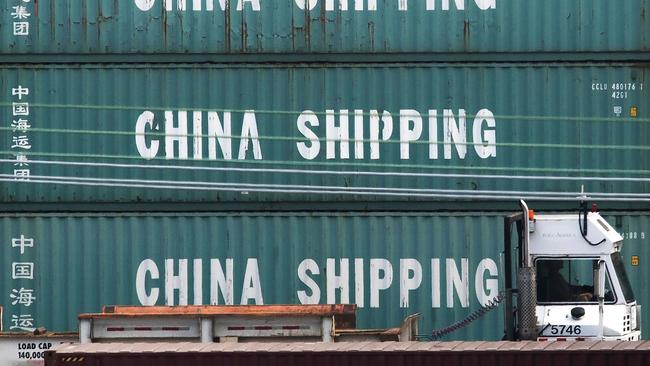
- Easing, goodwill drives ASX gains
- JB Hi-Fi forecasts $4.8bn Aus sales
- DJs, Myer brand war heats up
- ECB unveils stimulus
That’s it for the Trading Day blog for Friday, September 13. Australian stocks finished 0.21 per cent higher in Friday’s trade, to cap a 0.3 per cent weekly gain. Tech and gold stocks led the pull back, while ASIC chair James Shipton faced a grilling by a parliamentary committee.
4.29pm: Gold slip weighs on market
Markets were risk on after positive global developments, pulling gold stocks lower to continue the recent reversal.
“Risk appetite has shown marginal improvement which is likely to continue as political uncertainty fades from headlines and central bank rhetoric remains supportive amid the uncertain growth outlook,” ANZ head of FX Research Daniel Been said.
“In this environment, we see modest support for risk, though given broader geopolitical rifts remaining in the system we are not chasing this move higher. “
Gold miners were the biggest weight in late trade.
By the close, Newcrest pulled lower by 2.81 per cent to $33.51 – with further downside pressure from hurdles with its PNG operations.
Evolution Mining fell back by 3.4 per cent to $4.54, Saracen gave back 1.77 per cent to 43.33 while Northern Star dropped 2.63 per cent to $10.38.
4.24pm: Easing, goodwill drives ASX gain
Further easing and goodwill between the US and China helped to turn global market sentiment on Friday, but the local benchmark largely shrugged off the positive tone.
In a choppy day of trade, the ASX200 jumped as much as 0.3 per cent early, dipped to negative at midday but closed the session higher by 14 points or 0.21 per cent at 6669.2.
That’s a 0.33 per cent gain for the week – to continue the market’s streak of wins to a fourth week.
Meanwhile, the All Ordinaries finished up 11 points or 0.17 per cent to 6777.1
Reports of the US considering an interim trade agreement with China added to optimism of a trade resolution, after a number of goodwill gestures and tariff exemptions in the past 24 hours, while stimulus from the ECB helped to boost bond yields broadly.
Sarah-Jane Tasker 3.21pm: Public health can meet waiting lists: CS
Australia’s public hospital system has the capacity to meet increasing waiting lists, according to analysts, as volume growth in the private health system continues to slow.
In a new report, analysts at investment banks Credit Suisse said their analysis of the public system suggested there was sufficient “theoretical” capacity to account for the rise in absolute number of patients on waiting lists. But it added that an increase in the efficiency of public hospitals was required to ensure waiting list times remained steady.
The public system was not constrained to the point that large scale government reforms would occur, the report said.
The report comes as the private health system pushes for reform as more Australians turn away from private health insurance due to affordability concerns. Debate on the issue has highlighted that patients increasingly turning to the public system would put pressure on waiting lists and force the government to act.
Despite that, NIB is one of the best peforming stocks in afternoon trade, last up 4.74pc to $7.51.
3.14pm: Domino’s ready for rebound: BP
Trading momentum is building across all of Domino’s trading regions, and shares are set to rebound, according to Bell Potter.
In a note by Sam Haddad, the broker upgrades the pizza franchise, saying Europe is at a positive inflection point after a year of transition under new management.
He says France has the most to gain as it sets out to open a “record number” of stores in FY20, while Belgium, Germany and France will soon reap the rewards of TV advertising.
A little closer to home, in the Japanese market, Mr Haddad says new leadership and a digital platform are pulling the region’s business from strength to strength while Aussie sales momentum is rebuilding.
The broker increased its price target on the stock to $60 from $52.30.
DMP last up 1.11pc to $46.63.
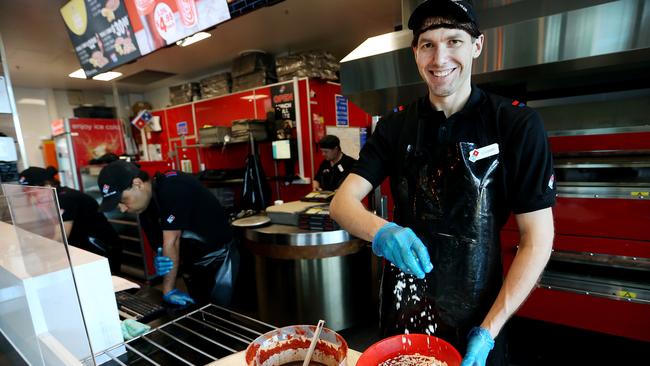
2.56pm: Syrah takes fresh hit on results
Syrah Resources is seeing strong selling action for the second time this week, as the graphite miner posted a $US81 million ($118m) loss for the June half.
One of the most heavily shorted stocks on the market, Syrah was pummelled in Tuesday’s trade after it lowered its production targets in a bid to curtail the commodities price slide.
But just as the stock had attempted a recovery, shares are again today being hit by the company’s interim result - revealing $US66 million in asset impairments and $US4.8m in inventory write downs.
Shares in the miner are off by 7.82 per cent to 50.7c, still off Tuesday’s low of 42c.
2.48pm: CSL, gold pulling ASX lower
The local market has given up much of its early gain, as gold miners and CSL continue to weigh.
The market had been up as much as 0.3 per cent in early trading, but is now just 6 points or 0.1 per cent higher at 6660.7.
Tech and energy stocks are weighing most, with 0.6pc and 0.5pc sector losses respectively.
NIB is leading market advancers with a 4.4pc gain while Pro Medicus continues to pull back, last down 4.95pc to $28.21.
ASX200 last at 6661.4.
Bridget Carter 2.32pm: Lazard winding down Perth office
Financial advisory firm Lazard is understood to be winding down its Perth office as part of a shift in its strategic direction that will see the advisory firm concentrate on larger deals in the market.
Following a decision from Lazard’s New York-based head office, the advisory firm will also shut other regional offices in Singapore and Mumbai, along with Perth, and it will run its Australian operations out of its offices based on the east coast.
Lazard’s West Australian base is run by resources banker Trent Lisle who oversees at least five other staff in the office and is believed to weighing his future options.
The closure will no doubt come as a blow to Lazard Perth which has secured some lucrative mandates for the company over the years, including those working for Fortescue Metals, Atlas Iron and Mineral Resources.
For the six months to June, Lazard reported a 38 per cent fall in its net income to US$191m compared to of US$309m in the previous corresponding period, as revenue also fell 15 per cent to US$1.25bn.
1.52pm: Newcrest hits PNG hurdle
Papua New Guinea wants to keep 40 per cent of gold produced from the proposed Wafi-Golpu project, the country’s commerce minister says, creating a potential hurdle to an agreement with co-owners Newcrest Mining and Harmony Gold.
The miners had been hoping to secure a mining lease over the major gold and copper deposit this year before a change in PNG’s leadership and a shift in minerals policy led to delays.
“We’d like to see Newcrest come to the negotiating table on this,” Commerce and Industry Minister Wera Mori told Reuters late on Thursday.
“They get 60 per cent of the production, we get 40 per cent. If they don’t like it we’ll mine it ourselves - we own the resources.” Mori said the government could offer concessions on duties and taxes as part of the negotiations and he said he was confident a deal would be struck.
Newcrest and Harmony each own 50 per cent of Wafi-Golpu, while the PNG government has the right to purchase an equity interest.
NCM last traded lower by 3.48pc to $33.28.
Reuters via AAP
1.34pm: Junior telco doubles value on merger
Mobile roaming provider United Solutions has more than doubled its market value, after unveiling an all-scrip deal to buy telco services group Broadband Solutions.
The two junior telcos will combine their mobile and telco services in a deal worth $8.79 million at today’s market pricing.
Combined, the two have pro forma revenue of $17.6 million, with synergies from the merger to be realied within the FY20 year.
Upon completion Broadband Solutions’ Victor Tsaccounis will become chief executive, while current chief Nick Ghattas will move to the chief operating officer role.
“This alliance provides immediate synergies and revenue growth opportunities for the company. I am personally looking forward to working with the existing UNL board and executive team to achieve positive growth and returns for the UNL shareholders,” Mr Tsaccounis said.
UNL shares surged to 3.7c on the news, last up 135pc to 3.3c.
Richard Gluyas 1.32pm: Low rates to hit smaller lenders: APRA
The banking regulator has warned that now is not the time to get complacent about financial stability, with ultra-low interest rates crimping industry profitability and the banks’ capacity to generate organic capital.
APRA chairman Wayne Byres said smaller lenders were likely to be hit harder than the big four given their different funding profiles and lower credit rating ratings, which could hurt their ability to compete.
“But to be clear, neither group will welcome further rate reductions,” Mr Byres told a European Australian Business Council lunch in Melbourne on Friday.
The APRA chief’s appeal for an “unwavering focus on financial stability” comes at a time of intensifying macroeconomic challenges and vulnerabilities, rapid technological change and political tensions.
Trade tensions between the US and China have escalated, Britain is staring down the barrel of massive disruption from a hard Brexit, China’s authority in Hong Kong is under serious challenge, and world economic growth is slowing.
Central banks have pulled hard on the interest-rate lever to revive growth but the efforts so far have failed.
As the storm clouds gathered, Mr Byres said, the Australian banking system was broadly in sound prudential shape, reflecting the regulatory focus on steadily building resilience in the system.
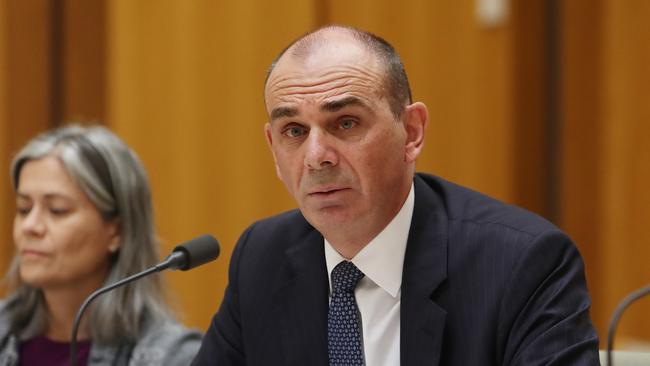
1.19pm: US CPI won’t change Fed cut: BlackRock
The US consumer price index print might have firmed last month, but that won’t prevent easing from the Federal Reserve next week, according to BlackRock.
Chief investment officer of Global Fixed Income, Rick Rieder says the Fed remains on track to act, with the Fed’s favoured inflation measure of Core PCE gaining just 0.2pc in July.
“We don’t expect this firming inflation trend to meaningfully alter the expected policy rate path from the Fed, since the central bank will both “look through” some degree of tariff-related price rises as being potentially temporary, and policy makers will be laser focused on the labor market, which has slowed somewhat of late,” Mr Rieder notes.
In August, the unemployment rate printed at 3.7pc, but he notes that average hourly earnings gains were 3.2pc on a year-on-year basis, signalling consumer spending potential - continuing the “remarkable resilience” of the US consumer.
He tips another 25 basis point cut next week, and possibly further cuts at the October and December meetings.
“In our view, another two policy rate cuts would bring rates closer to equilibrium. Today, we find ourselves in a world characterized by widespread central bank easing, a global desire for currency competitiveness, and a broad-based inability to achieve the goal of higher inflation,” he adds.
“And while fiscal policy solutions would be apt to help support growth in many regions, this has become politically untenable in many countries, so global central bankers stand poised to act.”
12.53pm: Stocks dip to negative trade
The Australian market has briefly dipped into the negative at lunch, as global market optimism on trade and ECB easing fails to lift local shares.
Stocks reached a session high of 6676.5 in the second hour of trade, but have given back all gains to briefly trade in the red at 12pm.
Gold miners are largely to blame, with majors Newcrest, Evolution and Northern Star collectively taking almost 6 points off the local market.
It comes as bond yields rose overnight, and markets continued to trade risk-on after positive developments in the US-China trade row.
Elsewhere, banks are driving strength in the market, led by Commonwealth Bank’s 0.65pc rise. ANZ is higher by 0.78pc, NAB by 0.5pc but Westpac is up by just 0.1pc.
A parliamentary committee continues to grill ASIC chair James Shipton.
ASX200 last at 6659.7.
David Swan 12.43pm: New telco Circles.Life launches
A new telco launched in Australia on Friday, with the Singapore-based Circles.Life offering customers four months free service if they sign up before September 30.
Billed as “one of the world’s first fully digital telcos”, Circles.Life’s main proposition seems to be value, offering 20GB of data and unlimited calls and texts for $28 per month with no long-term contracts. The service runs on the Optus network.
“We aim to set a new benchmark for customer satisfaction in the country,” general manager Ben Murray said.
“We’re stepping up the game by offering a premium customer experience and we dare Australians to like their telco.”
It’s a busy week for the telco sector with Vodafone and TPG fighting for the right to merge, in a case against the ACCC in federal court.

12.35pm: iSignthis soars as concerns denied
Payments tech developer iSignthis has denied allegations that have sparked share price upheaval for the fintech company this week.
The Melbourne-based firm has seen its shares swing from an intraday high of $1.765 on Tuesday to an intraday low of 90 cents on Thursday amid questions over performance bonuses worth hundreds of millions of dollars.
In a statement to the ASX on Friday, the company denied allegations its ownership was opaque or that top executives had met performance targets by only $1,347.
ISX shares last up 14.5pc to $1.065, after touching as much as $1.26 in early trade.
AAP
Ben Wilmot 12.18pm: Qualitas raises $39m for growth
Melbourne-based finance house Qualitas has bolstered the size of its listed property debt and equity trust by raising $39 million from wholesale investors and will shortly open up to retail investors.
The Qualitas Real Estate Income Fund completed the wholesale component of its one for one accelerated non-renounceable entitlement offer that it unveiled on Wednesday at an offer price of $1.60 per unit.
“This is a pleasing result for the first stage of our QRI capital raising and demonstrates continued support for the fund. We look forward to raising additional funds through the retail entitlement offer opening next week. During this time, wholesale and retail investors will be given an opportunity to bid for any retail shortfall units should that arise,” Qualitas global head of capital managing director Tim Johansen said.
Evans Dixon Corporate Advisory is lead arranger and it also joint lead managers alongside Shaw and Partners for the funding round in which investors were offered up to $262m of stock.
The fresh capital will allow the listed income fund to expand its operations and capitalise on more opportunities across both residential and commercial property, lifting its profile as an alternative lending source as the big banks keep a tight leash on the sector.
Ben Wilmot 11.57am: Rural Funds takes Bonita to court
The Rural Funds Group is continuing to hit back against US short-selling outfit Bonitas Research by issuing legal proceedings against the firm and its principal, Matthew Wiechert.
Rural Funds was sold off early last month after Bonitas circulated a savage critique of the company, prompting a share price plunge.
Bonitas founder Mr Wiechert is also behind Glaucus Research, the firm which successfully targeted Blue Sky Alternative Investments last year.
But the latest target company effectively fought back saying it was rewriting the rule book on dealing with aggressive short-sellers and its share price has largely recovered.
Rural Funds, which owns about $869m worth of properties, survived the onslaught by forensically picking apart the claims against it.
The company said that on August 6 and 8 Bonitas had “selectively released” documents regarding it operations.
RFF last traded higher by 2.45pc to $2.09.
11.39am: Macq bullish on Aussie gold miners
Macquarie has lifted its gold price outlook, tipping the price of the precious metal to peak at $US1650 per ounce in late FY20, consequently raising the outlook for Aussie gold miners.
In a note titled “Throwing caution to the wind”, Macquarie says prospects for higher gold prices has driven material near-to-medium term EPS upgrades across all the gold stocks under its coverage.
The broker sees an 11pc lift to its long-term pricing assumptions, from $US1250/oz to $US1400/oz, as rates stay lower for longer.
Macquarie points to Newcrest and Evolution as “low risk” margin maximilisation buys, while Northern Star and Saracen Minerals are “unashamed growth stories”.
“Whilst we understand the attraction of NCM and EVN on ‘vanilla’ earnings we believe this ignores the declining earnings trend of both companies compared with upside presented by NST and SAR,” analysts note.
“We still see upside in the African names with RSG the standout while we also believe explorers of meaningful intent also show value which is highlighted by BGL as a key pick.”
All gold miners mentioned are trading lower in Friday’s trade.
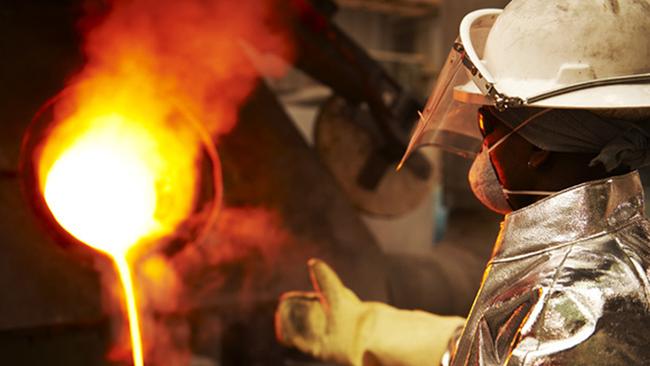
11.33am: ACCC clears Virgin UK tie-up
The competition watchdog has cleared the way for Virgin Australia to more closely cooperate with its British equivalent, Virgin Atlantic.
Approval paves the way for the two airlines to coordinate with each other on flights between Australia and the UK and Ireland, via Hong Kong, Los Angeles and other future mutual connecting points.
“Authorisation will allow the two airlines to coordinate on a wide range of matters, such as jointly managing prices, inventory, and marketing strategies, which are not currently permitted in their existing arm’s length commercial codeshare and loyalty arrangements,” the ACCC said in its statement today.
VAH shares last traded flat at 16c.
11.20am: Magellan leads market gainers
Magellan Financial Group is one of the most improved on the benchmark in the second hour of trade, amid broad strength across financials.
The fund manager is adding 2.4 per cent to $52.60, outpacing the 0.3pc rise on the ASX.
Pinnacle Investments is also outperforming, last up 2.34pc.
The benchmark is trading 17 points or 0.3pc higher at 6672.3.
10.58am: Westpac div under threat with new CFO
Citi banking analyst Brendan Sproules is tipping a 10 per cent cut to Westpac’s full year divend, as an incoming CFO is unlikely to hold a dividend that is too tight.
Mr Sproules notes that the bank has always strongly defended its dividend, but says the evolving NZ capital situation will require more headroom while a change of management wonn’t have the same priorities.
Current CFO Peter King yesterday announced his intention to retire next year, and Citi says “a new CFO is unlikely to want to hold a dividend that is too tight for the medium term challenges, in our view”.
Alongside that, the board is likely to be more conscious of shareholder concerns following its first remuneration strike last year.
“With a current dividend yield > 6pc, and above peers, we think the market has already priced in a cut,” Mr Sproules says, but keeping his rating at Buy.
WBC last flat at $29.66.
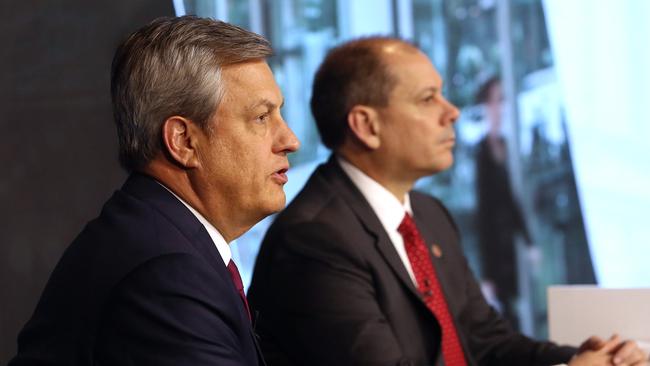
10.50am: Whitehaven outperforms on M&A talk
Whitehaven Coal has jumped 1.5 per cent in early trade on reports its circling the Olive Downs mining project owned Denham Capital.
The Australian’s DataRoom reports a stake of between 25 per cent and 35 per cent is on the market through investment bank UBS, prompting various parties to eye the asset.
The project is believed to be worth more than $1bn and it remains unclear if Whitehaven is eager to buy a stake in Olive Downs or the project as a whole.
WHC shares last higher by 0.9pc to $3.410.
Michael Roddan 10.35am: ASIC appeal to defending lending law
The corporate watchdog has warned lenders will be able to disregard the law and do “whatever” they like in assessing borrowers’ ability to repay loans if it doesn’t appeal a landmark responsible lending case it lost last month.
Appearing before a fiery public hearing for the Senate Parliamentary Joint Committee on Corporations and Financial Services, watchdog chairman James Shipton said the regulator has received two legal opinions that the contentious “Wagyu and shiraz” ruling in the Federal Court last month was worthy of an appeal.
“We have the absolute respect for the judges of the federal court. We’ve had a very close look at the decision and analysed it and decided that we believe there is a need to provide and seek greater clarity and certainty for lenders to lend responsibly,” Mr Shipton told MPs and Senators.
The Australian Securities & Investments Commission on Tuesday lodged an appeal to the decision in its case against Westpac last month, in which Federal Court Justice Nye Perram dismissed a claim by the watchdog that the bank had breached responsible lending practices when assessing customer applications.
However, Liberal MP Jason Falinski and Senator James Patterson accused the regulator of injecting further uncertainty into the market by taking the case to appeal.
Eli Greenblat 10.26am: DJs, Myer brand war steps up
The department store wars that is triggering a raft of poaching and prisoner swaps between Myer and David Jones for fashion brand exclusivity has stepped up a notch with David Jones announcing Friday it has grabbed Sportscraft, Saba and JAG.
It comes as David Jones last year stripped Myer of the Country Road Group brands, which David Jones parent Woolworths Holdings owns as well. Those brands include Country Road, Mimco, Trenery and Politix, have been exclusive at David Jones from September 2.
David Jones announced today an exclusive partnership with Australian apparel group APG&CO, which will see Sportscraft, Saba and JAG available exclusively via David Jones stores and APG&CO boutiques.

10.16am: Early jump less than tipped
The local market has edged higher by 11 points in early trade, to a lesser degree than tipped, with gains across most sectors besides energy and REITs.
At the open, the benchmark ASX200 is up 11 points or 0.16pc to 6665.8.
Major banks are driving much of the strength, as bond yields edged higher overnight - the four majors are up between 0.1pc to 0.7pc.
Meanwhile, BHP miners are mixed despite a pick up in iron ore overnight - BHP is higher by 1.9pc, Rio is lower by 0.22pc and Fortescue has dialled back by 0.28pc.
ASX200 last at 6666.1.
10.06am: Growth to pick up in H2: ANZ
ANZ says were at the nadir of economic growth, with stimulus set to prop up the economy over the next second half of the year.
In an udpate to its outlook, senior economist Felicity Emmett says stimulus from both interest rate cuts and tax cuts will drive a pick-up in economic growth, driving positive momentum in household spending.
That said, she notes that the bank expects two further rate cuts.
“We are looking for GDP growth to be 2.4 per cent through 2019, lifting into the high 2s by end 2020, before slowing a little in 2021 as the impact of the stimulus coming from fiscal and monetary policy fades,” Ms Emmett notes.
“Without the additional stimulus from monetary policy (in the form of two rate cuts in H1 2020), we would have downgraded the growth and employment outlook.”
ANZ expects unemployment to peak at 5.4pc before improving very gradually through 2021 to 2021.
While our updated forecasts haven't changed much, this hides a weaker underlying story as the new forecasts incorporate a drop in the RBA's cash rate to 0.25%. https://t.co/9ldi9x40Aj
— David Plank (@DavidPlank12) September 12, 2019
9.52am: ASIC ’failed to protect’: Committee
A parliamentary committee says financial regulators such as ASIC - as much as the banks - have earned the public’s scepticism following the revelations aired at the royal commission.
NSW Liberal Senator James Paterson, in his opening remarks as chair of the Parliamentary Joint Committee on Corporations and Financial Services, told ASIC chair James Shipton consumers felt ASIC had “failed to protect them from bad practices”.
“We have a collective responsibility to restore trust in our institutions,” Senator Paterson said.
AAP
Eli Greenblat 9.49am: JB Hi-Fi forecasts $4.8bn Aus sales
JB Hi-Fi has reconfirmed its earnings outlook for 2020, telling shareholders in its annual report that it is forecasting its Australian JB Hi-Fi arm to post sales of $4.84 billion, JB Hi-Fi New Zealand $240 million and The Good Guys to have sales of $2.18 billion.
JB Hi-Fi is tipping group annual sales of $7.25 billion in 2020, up against sales of $7.1 billion in 2019.
Chairman Greg Richards and CEO Richard Murray said while they continue to see variability in the sales environment the company entered 2020 with confidence in its ability to grow market share.
The annual report released Friday shows Mr Murray received total remuneration for 2019 of $3.39 million. He received $3.361 million in 2018.

9.36am: Alexander adds to Crown defence
Crown executive chairman John Alexander has again declared the group runs a compliant business, using its annual report to note that allegations of dodgy dealings were having an impact on the business and its employees.
He said the positive contributions of the business “risk being overshadowed by recent media reporting which has unfairly sought to tarnish Crown’s reputation”.
“It comes as no surprise that various regulators and other agencies have launched inquiries given recent media reports and the sensationalist nature of the allegations raised,” Mr Alexander said.
“We view these regulatory inquiries as a forum to provide our perspective and look forward to cooperating through the process, as we have always done.”
For the year ending June 30, Crown reported a net profit of $369 million, down 5pc on the previous year amid subdued market conditions as VIP softness continues.
The chairman also said construction of the Crown Sydney Hotel Resort was “well advanced” and that pre-opening activities had commenced and would escalate through the year in preparation for the opening in 2021.
9.25am: Trade optimism to drive ASX gain
Optimism about the outlook for US-China trade talks has spurred gains in the overnight session, and is set to rub off on the local market.
Overnight futures relative to fair value suggest an early gain of 0.2 per cent, after the S&P 500 clocked a 0.3 gain to close within 0.5 per cent of its record high.
The boost was driven by the recent easing in tone between US President Donald Trump and Chinese Prime Minister Xi Jinping, with both unveiling “goodwill gestures”, suggestions that officials had discussed offering a limited trade agreement to China.
Adding further fuel to the rally, US CPI data for August beat expectations with a 0.3pc gain verus 0.2pc tipped.
But it was the ECB meeting that was the key focus - President Mario Draghi delivered an easing package that fell just short of consensus, with a 10bp cut to the deposit rate to -50bps from -40bps, and a tiering for banks so as not to undermine their profitability.
Alongside that, the council announced more generous terms for its targeted long term refinancing operations and an open-ended QE bond-buying programme at a rate of EU20 billion per month, starting November.
In his speech after the measures were announced, Mr Draghi said “there was unaminity... that fiscal policy should become the main policy instrument,” effectively ruling out further stimulus.
The Euro traded higher, along with benchmark Eurozone bond yields, while US 10-year Treasuries finished 3.3bps higher - up 35bps from their beginning of September lows.
ASX200 last at 6654.9.
9.10am: What’s impressing analysts, what’s not
- Beach Energy price target raised 32pc to $2.50 - RBC
- Bendigo and Adelaide Bank cut to Sell - Morningstar
- Domino’s Pizza price target raised 15pc to $60 - Bell Potter
- Evolution Mining raised to Outperform, price target raised 29pc to $5.40 - Macquarie
- Fortescue cut to Sell - Morningstar
- GUD Holdings cut to Hold - Morningstar
- Independence Group price target raised 9pc to $7.40 - Macquarie
- New Hope rated new Neutral, price target $2.55 - Citi
- Newcrest mining raised to Neutral - Macquarie
- Northern Star raised to Outperform, target price raised 42pc to $14.20 - Macquarie
- Ramsay Health raised to Neutral - Credit Suisse
- Regis Resources raised to Outperform, target price raised 9.8pc to $5.60 - Macquarie
- Resolute Mining price target raised 17pc to $3.50 - Macquarie
- Saracen Minerals raised to Outperform, price target raised 30pc to $4.30 - Macquarie
- St Barbara raised to Outperform, price target raised 17pc to $3.50 - Macquarie
- Orora cut to Sell - Morningstar
- Whitehaven cut to Hold - Morningstar
8.48am: Eclipx offloads equipment finance
Vehicle leasing group Eclipx has offloaded its commercial equipment finance arm for $14.6 million.
The move is the latest in the group’s simplification plans, laid out after McMillan Shakespeare ditched its $2 billion merger offer at the start of the year.
Announcing the sale to the market, Eclipx said the consideration represented a marginal premium to its net tangible assets, with the proceeds to be used topay down corporate debt.
Staff of Commercial Equipment Finance Australia will transition with the business.
Eclipx said the deal was set to close in the coming days, and that the sale would result in an accounting loss of $15 million, related to the write-off of deferred tax and intercompany loans.
8.25am: China seeks to narrow trade talks
China is looking to narrow the scope of its negotiations with the US to only trade matters, seeking to put thornier national-security issues on a separate track in a bid to break deadlocked talks with the U.S.
Chinese officials hope such an approach would help both sides resolve some immediate issues and offer a path out of the impasse, people familiar with the plan said.
Thursday’s move is the latest in a series of steps officials in Washington and Beijing are taking to ease trade tensions ahead of high-level negotiations in October.
Dow Jones
8.00am: ASX set to mirror Wall St
The Australian share market is expected to open higher as global equities strengthen on positive US-China trade developments.
At 8.00am (AEST) the SPI200 futures contract was up 22 points, or 0.33 per cent, at 6,670.0, suggesting the benchmark S&P/ASX200 will climb at Friday’s open.
Stocks rose in overnight trade as China and the US made concessions ahead of next month’s planned talks in Washington.
On Wall Street, technology shares led the S&P 500 higher by 8.64 points, or 0.29 per cent, to within touching distance of its all-time high at 3,009.57. The Dow Jones Industrial Average rose 45.41 points, or 0.17 per cent, to 27,182.45 and the Nasdaq Composite added 24.79 points, or 0.3 per cent, to 8,194.47.
Copper and iron ore prices have climbed, while gold is also higher despite fading as global trade rhetoric improved.
Oil has slipped again after a meeting of the OPEC alliance yielded no decision on deepening crude supply cuts.
The Aussie dollar is buying US68.67 cents, down from US68.83 cents on Thursday.
AAP
7.30am: Oil prices fall
Oil prices have fallen about 1.0 per cent after a media report cast doubt on the possibility of an interim US-China trade deal and as a meeting of the OPEC alliance yielded no decision on deepening crude supply cuts.
Oil was pressured further after the European Central Bank cut its deposit rate to a record low -0.5 percent from -0.4 per cent and said it will restart bond purchases of 20 billion euros a month from November to prop up eurozone growth.
Brent crude futures settled at $US60.38 a barrel, shedding 43 US cents, or 0.71 per cent.
WTI crude futures settled at $US55.09 a barrel, losing 66 US cents, or 1.18 per cent.
Oil futures extended losses after a senior White House official denied a Bloomberg News report that the United States was considering a temporary trade agreement with China, according to CNBC.
Reuters
7.00am: US stocks gain on ECB, trade
Wall Street stocks finished higher after the European Central Bank announced new stimulus measures and as investors greeted further signs of moderation in the US-China trade war.
The ECB moves bolstered expectations the US Federal Reserve will take another step to protect economic growth next week with a second interest rate cut.
The Dow Jones Industrial Average ended the day at 27,182.45, up 0.2 per cent, increasing for the seventh straight session.
The broad-based S&P 500 climbed 0.3 per cent to close the session at 3,009.57, while the tech-rich Nasdaq Composite Index also advanced 0.3 per cent to 8,194.47.
Australian stocks are tipped to build on yesterday’s gains and open higher. At 6.55am (AEST) the SPI futures index was up 24 points.
US markets were in positive territory virtually the entire day but pulled back from session highs in the last half-hour of trading after flirting with records.
“We’re swinging back into normal territory with the focus back on trade and monetary policy,” said Art Hogan, chief marketstrategist at National Securities.
In a highly-anticipated move, the ECB cut a key interest rate deeper into negative territory, and announced new net purchases of government and corporate debt and support for struggling banks as outgoing chief Mario Draghi urged eurozone governments to spend more.
The ECB announcement came after President Donald Trump pushed back a round of tariff increases on China from October 1 to October 15 after Beijing agreed to spare some US products from its retaliation.
US Treasury Secretary Steven Mnuchin said trade negotiators are seeking “meaningful progress” with China in October talks.
Previous rounds of talks have failed to yield agreement.
AFP
6.58am: Google settles France tax case
Tech giant Google said Thursday it has paid over $US1 billion to French authorities to settle a years-long dispute over allegations of tax fraud.
A Paris court approved a penalty of 500 million euros ($US551 million) from the digital giant over charges of tax evasion, and Google said it paid a further 465 million euros ($IS513 million) in “additional taxes.” French investigators have since 2015 been investigating Google’s tax set-up.
The company, like many multinationals, declares profits from activities across theEU in one country, usually a low-tax state. Google declares most of its earnings in Ireland.

AP
6.56am: Iron ore rises again
The spot price of iron ore rose 3.5 per cent to $US98.85, CommSec said.
6.55am: ECB stimulus lifts stocks, euro
European stock markets rose on Thursday after the ECB unveiled a massive stimulus program and cut interest rates to goose a sluggish eurozone economy.
The euro was volatile, dropping against the dollar in an initial reaction before recovering in late business.
The ECB took a key interest rate further into negative territory in its first rate cut since 2016 and announced it would resume stimulus via asset purchases at the rate of 20 billion euros per month and cheap loans to banks.
While the quantitative easing (QE) stimulus amount may have been lower than some analysts expected, the tone of the ECB was more dovish.
“This commitment to more QE is open-ended: it will end shortly before the Bank begins raising interest rates,” said Andrew Kenningham, chief European economist at Capital Economics.
Meanwhile, the ECB said it wouldn’t raise interest rates until it saw inflation moving up towards its goal of just under 2.0percent over the medium term.
- ‘Italian stallion’ -
Key eurozone stock markets were higher at the close thanks to the prospect of cheaper money.
But the euro, in the moments following the ECB’s announcement, fell more than a cent against the dollar, dropping below $US1.10. Then it recovered.
Equity markets also found some support amid signs of easing trade-war tensions between China and the United States.
US President Donald Trump on Wednesday said he would delay hiking tariffs on some Chinese goods, just hours after Beijing announced it would remove a range of American products from its own planned levies.
Elsewhere on Thursday, oil prices extended recent losses as traders bet on a possible return of Iranian crude to the market after the firing this week of Trump’s hawkish nationalsecurity adviser John Bolton eased fears of a conflagration in the Middle East.
London closed up 0.1 per cent, while Frankfurt and Paris both ended up 0.4 per cent.
AFP
6.51am: Spend more: ECB
European Central Bank chief Mario Draghi urged eurozone governments to spend more, while the Frankfurt institution launched new “big bang” interventions to prop up the economy as the outlook darkens.
Overcoming publicly-aired divisions on the institution’s governing council, the Italian economist announced a key interestrate deeper into negative territory, new net purchases of government and corporate debt and support for struggling banks.
While policymakers are confident in their actions, “one thing... was unanimous, consensus, namely that fiscal policy shouldbecome the main instrument” for stoking growth and inflation, Draghi said.
The interest rate cut immediately drew ire from US President Donald Trump, who tweeted that ECB policymakers “are trying, and succeeding, in depreciating the Euro against the VERY strong dollar, hurting US exports”.
AFP
6.50am: NZ buy-now, pay-later firm hits Australia
New Zealand’s largest buy-now, pay-later service has joined the increasingly crowded sector in Australia in partnership with the likes of Ally Fashion, footwear brand Senso and fast fashion retailer Glassons.
Privately owned Laybuy already has more than 1,200 Australian retailers and a new office in Sydney as it aims to compete with the likes of Afterpay Touch, Zip Pay, Humm and Splitit in the burgeoning pay-by-instalment space.
NZ retail veteran Gary Rohloff founded Laybuy in late 2016 with his 23-year-old son, Alex, and he describes it as the dominant player in New Zealand with half a million customers.
AAP
6.48am: Oil producers pledge to respect cuts
Oil producers pledged Thursday to comply with output cuts aimed at rebalancing the saggingmarket, but offered no further reductions in a sign they are short on options in a market depressed by US-China tensions.
OPEC kingpin Saudi Arabia led calls to abide by promises on production curbs that the cartel hopes will drive up prices --with some including Nigeria and Iraq accused of exceeding their quotas.
AFP
Cameron Stewart 6.45am: Facebook fight praised
The world’s leading competition regulators have welcomed Australia’s global lead in cracking down on Facebook and Google over their stronghold on advertising and misuse of people’s data.
In a meeting in New York around 30 heads of competition and antitrust agencies from all parts of the world discussed the landmark report of the Australian Competition and Consumer Commission which has recommended ways to rein in the dominance of US tech giants.
The meeting came only days after Attorneys general for all 50 US states launched an antitrust investigation of Google and the threat that its dominance poses to competition and consumers.
6.40am: US business chiefs press for guns action
Leaders of 145 top US corporations have called for passage of a law requiring background checks on all gun sales and allowing courts to take guns from “extreme risk” individuals.
The CEOs laid out their concerns in a letter Wednesday to leaders of the US Senate, publicly taking sides on a highly chargedissue in the wake of last month’s mass shootings in Texas and Ohio.
“Doing nothing about America’s gun violence crisis is simply unacceptable and it is time to stand with the American publicon gun safety,” they wrote.
The letter, which was published by The New York Times, was signed by the chiefs of businesses including Levi Strauss, Uber, Twitter, Bloomberg and Airbnb.
Noticeably absent, however, were some of the biggest US financial and tech companies, including JPMorgan, Google and Facebook.
AFP
6.35am: ECB’s gloomy outlook
ECB chief Mario Draghi gave a gloomy assessment of the eurozone economic outlook as the bank slashed growth forecasts for 2019 and 2020, saying that a “more protracted weakness” of the single currency area is expected ahead.
“Incoming information indicates a more protracted weakness of the eurozone area economy, the persistence of prominent downsiderisks and muted inflationary pressure,” said Draghi.
“Continuing weakness of international trade in an environment of prolonged global uncertainties” is particularly hurting theeurozone’s manufacturing sector, he added.
The ECB cut its growth outlook for the eurozone for this year and next, while predicting inflation to come in at a lower rate through to 2021.
The single currency area’s output growth is now expected to reach 1.1 per cent in 2019 and 1.2 per cent in 2020, down from 1.2 per cent and 1.4 per cent respectively.
Inflation was meanwhile seen reaching 1.2 per cent in 2019, 1.0 in 2020 and 1.5 per cent in 2021.
AFP
6.30am: US inflation gauge jumps
A key measure of US inflation last month took its biggest leap in more than a year as costs for hospital services and over-the-counter medications rose, according to a government report Thursday.
Despite signs of prices may finally be starting to heat up, the Federal Reserve is widely expected to cut interest rates again next week as policymakers seek to ward off the dangers of a slowing world economy and President Donald Trump’s trade conflicts.
After several years of low unemployment failed to ignite inflation, a single month’s data may not be enough to persuade economists the long-expected return of price pressures has begun.
The Consumer Price Index, which tracks costs for household goods and services, rose 1.7 per cent compared to August of last year, down a tenth of a point from the prior month, weighed down by falling gasoline and electricity prices.
But when volatile food and energy prices are stripped out, the “core” CPI surged 2.4 per cent, the biggest gain since July of last year.
AFP
6.25am: Trump hits Fed after ECB
President Donald Trump attacked the Federal Reserve again Thursday for not “acting quickly” like its European counterpart to provide stimulus to the US economy.
After the European Central Bank unveiled a massive stimulus program, Trump said on Twitter, “They are trying,and succeeding, in depreciating the Euro against the VERY strong Dollar, hurting U.S. exports.”
“And the Fed sits, and sits,and sits,” Trump said in the latest blast against the US central bank.
AFP
European Central Bank, acting quickly, Cuts Rates 10 Basis Points. They are trying, and succeeding, in depreciating the Euro against the VERY strong Dollar, hurting U.S. exports.... And the Fed sits, and sits, and sits. They get paid to borrow money, while we are paying interest!
— Donald J. Trump (@realDonaldTrump) September 12, 2019
6.20am: The ECB’s plans
European Central Bank governors agreed Thursday to lower negative interest rates even further and resume their multi-billion-euro quantitative easing program to boost a slowing economy.
Here are the monetary policy tools the Frankfurt institution will deploy in the coming months to battle the widespread uncertainty-- over US-China trade tensions, Brexit, geopolitical clashes and emerging market woes -- weighing on the economic outlook.
Interest rates
The ECB has sunk interest rates to historic lows since the twin shocks of the global financial and eurozone crises as it pursuesits mandated inflation target of just below 2.0 per cent.
On Thursday, the bank decided to push the rate it charges on banks’ deposits down to minus 0.5 per cent from minus 0.4 per cent.
‘Tiering’
With an eye on complaints from banks that negative rates are hurting their business model, ECB chief Mario Draghi promisedsix weeks ago that “if we are to lower interest rates, that will come with mitigating measures”.
Those materialised Thursday with a “two-tier system... in which part of banks’ holdings of excess liquidity will be exemptfrom the negative deposit facility rate.”
Cheap loans to banks
In March, Draghi said the bank would offer a third series of cheap loans between September 2019 and March 2021.
The institution gave banks the chance to borrow massive amounts at extremely favourable interest rates in schemes known asTLTRO I and II between 2014 and 2016.
The measure was another attempt to encourage lending in a sluggish economy. Banks, especially the more fragile members of the sector in Italy, leapt at the chance for low-cost liquidity.
ECB policymakers said Thursday that, depending on how much the banks lend, they could enjoy a negative interest rate on theirborrowings “as low as the average interest rate on the deposit facility prevailing” during the loan’s lifetime.
Mass bond-buying
When lower interest rates alone failed to restore growth and inflation, the ECB turned to a policy of mass purchases of governmentand corporate bonds, known as “quantitative easing” or QE.
Between March 2015 and December 2018, policymakers bought up 2.6 trillion euros of debt, mostly at a pace of tens of billionsper month.
The aim: to flush newly-created money through the financial system and into the economy to stimulate growth.
Central bankers credit the scheme with helping ward off deflation and creating millions of jobs.
Now the ECB has relaunched its bond-buying, saying purchases of 20 billion euros per month will begin on November 1.
AFP
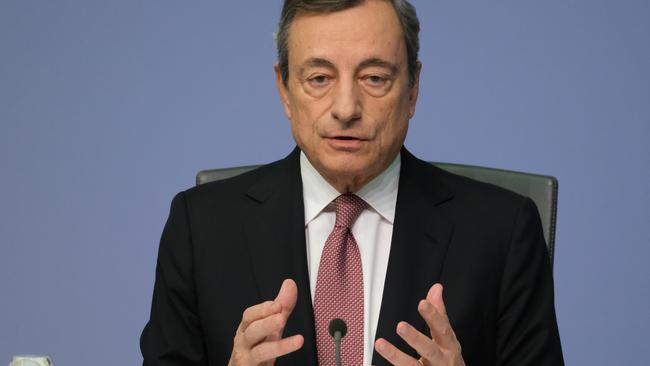
6.18am: ECB unveils stimulus package
European Central Bank governors overcame divisions Thursday to agree a “big bang” package of monetary easing measures, aiming to support the eurozone economy through external shocks.
A key interest rate deeper into negative territory, new net purchases of government and corporate debt and support to struggling banks were all agreed at the Frankfurt meeting, a spokeswoman said.
The moves mean president Mario Draghi, who will yield his seat to departing International Monetary Fund chairwoman ChristineLagarde on October 31, has set the tone for her first months -- and possibly years -- in office, although he will chair a final meeting next month.
“The final showdown has started with a big bang. The ECB just announced a big policy package to revive the eurozone economyand to bring inflation back to target,” said ING analyst Carsten Brzeski.
Looking in more detail at the measures, the interest rate on banks’ deposits with the ECB will drop to -0.5 per cent, from -0.4 previously.
Negative rates mean lenders pay the central bank to park their cash in Frankfurt.
Meanwhile the ECB left its two other headline rates unchanged, and said that all three would remain at present or lower levels “until it has seen the inflation outlook robustly converge” towards its just-below-two-percent target.
The “forward guidance” on rates abandons previous language naming mid-2020 as the earliest possible date for a rate hike.
New bond-buying
The biggest question ahead of Thursday was whether the central bank would restart “quantitative easing” (QE) net purchases of bonds, which amounted to 2.6 trillion euros ($US2.9 trillion) between 2015 and 2018.
Despite public opposition from governing council members like Germany’s Jens Weidmann or Dutchman Klaas Knot, QE will resume from November 1, at a pace of 20 billion euros ($US22 billion) per month “for as long as necessary” to boost inflation.
On top of the rates and bond-buying moves, policymakers also agreed a “tiering” system to spare some of banks’ deposits theharshest negative rates, after years of complaining from financial firms.
AFP
6.15am: US wants ‘meaningful’ trade progress
US trade negotiators want to make “meaningful progress” in upcoming talks with China, Treasury Secretary Steven Mnuchin said Thursday.
Mnuchin said on CNBC that Washington and Beijing will first hold talks at the deputy level to ensure senior officials whomeet later can advance towards a resolution.
“We want to make meaningful progress,” he said.
However, he again warned that President Donald Trump will only accept a good deal, and is willing to raise tariffs if necessary.
AFP

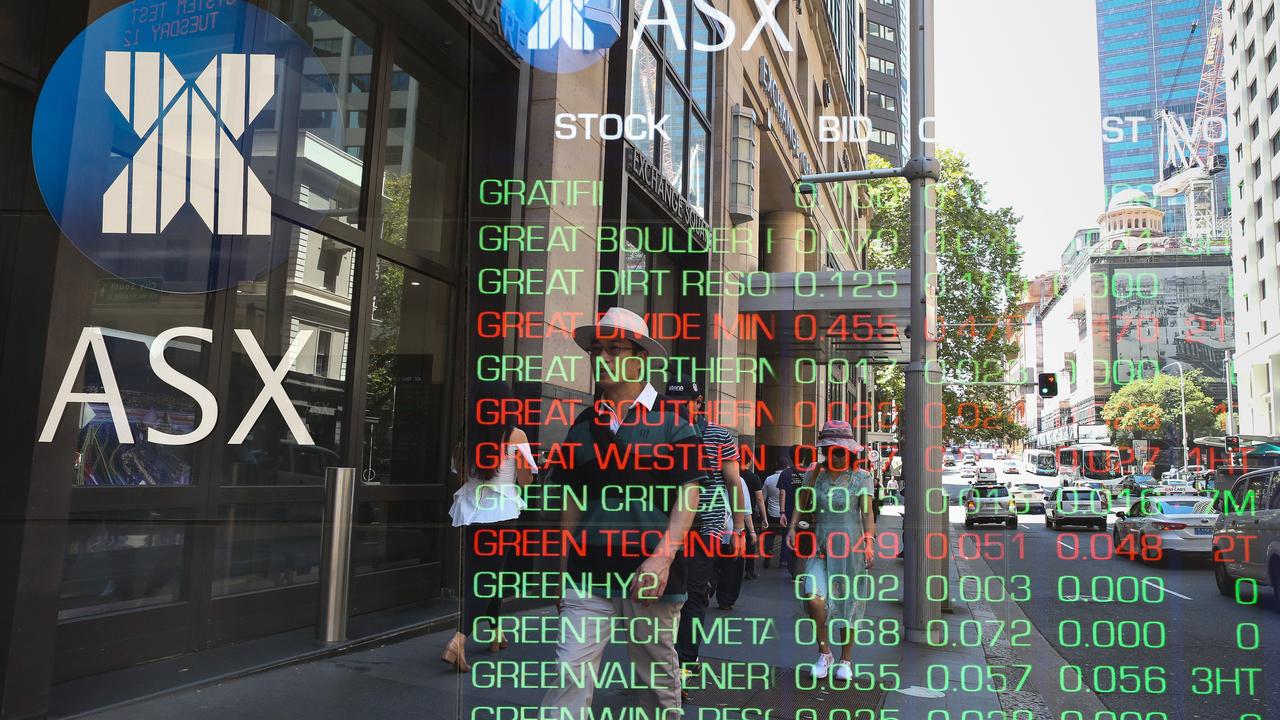
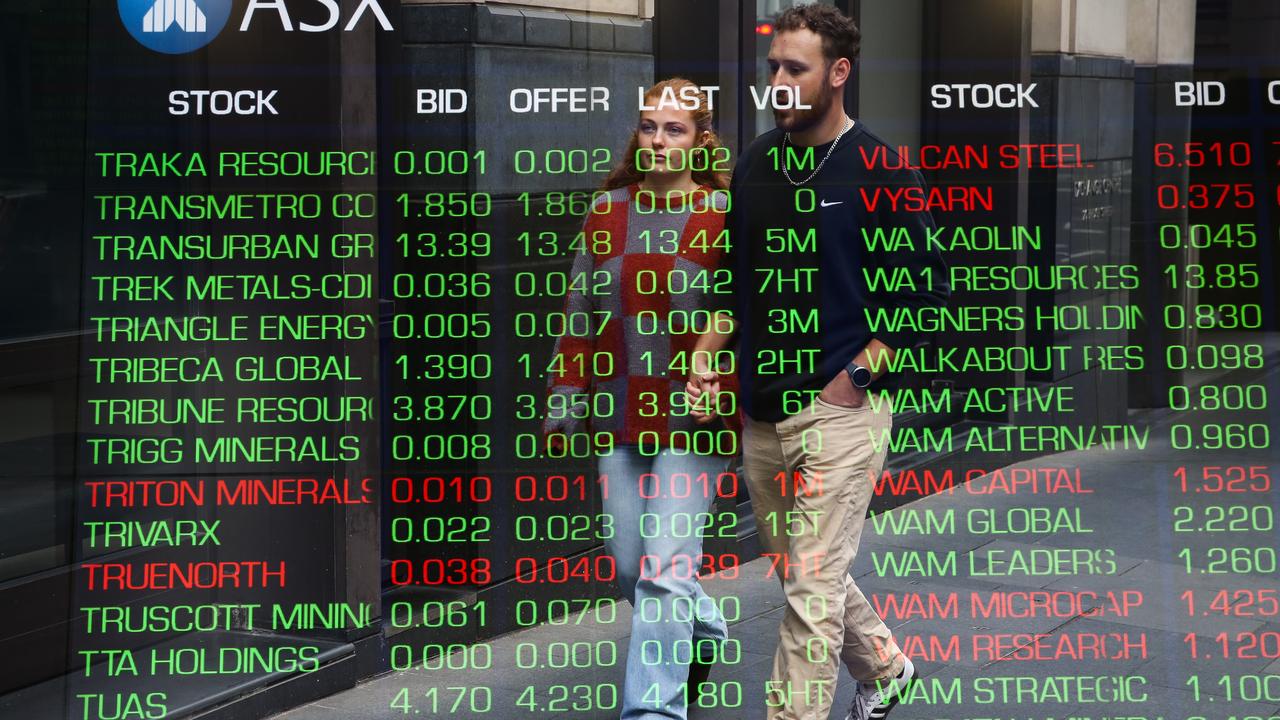
To join the conversation, please log in. Don't have an account? Register
Join the conversation, you are commenting as Logout